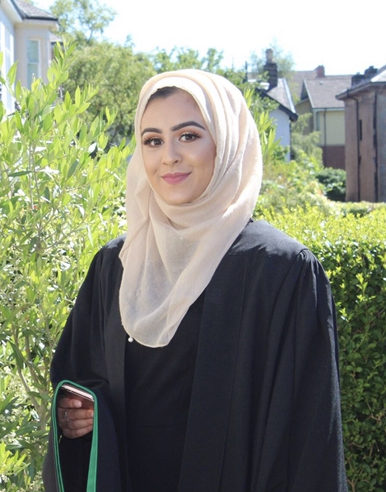Who am I? Rihana Din
What do I do? Orthoptist
Where do I work? Harrogate District Hospital
Which school did I go to? Glasgow Caledonian University
How long has I been in my role? 2 years


Rihana Din
Who am I? Rihana Din
What do I do? Orthoptist
Where do I work? Harrogate District Hospital
Which school did I go to? Glasgow Caledonian University
How long has I been in my role? 2 years
I possess strong communication skills, enjoy working autonomously and am passionate about providing the highest quality of healthcare. As a committed Orthoptist, I provide excellent clinical service to my patients and bring a broad range of skills including; direct patient care, companion care, excellent communication skills, confidence and most importantly dedication and passion. My time in practice has been extremely fulfilling, the staff and patients play a big part in allowing this, especially children. My passion for Orthoptics only began when I went to an open day at university, that’s were I knew this is exactly what I wanted to do. It was a perfect mix of science and patient care.
A day in the life of an Orthoptist is variable, challenging and yet very rewarding. No two days are exactly the same, you meet different people each day and each case will not be the same as the previous. In a typical day I see patients with simple to complex needs, ages ranging from a few months to 90 year olds and beyond! Referral routes for these patients vary from; opticians, GP’s, Health visitors and other specialities within the hospital.
One of the most common conditions I treat children with is lazy eye, I help to treat this with patching to improve the vision. I see adults and children with squints that are treated by surgery or botulium toxin injections by the eye surgeons. I also see patients who are experiencing double vision, it is my job to determine the cause of the double vision and manage the condition. I treat this with prisms to help alleviate the symptoms while all diagnostic tests are being preformed to identify the cause. As an Orthoptist, I am an autonomous practitioner, my role requires good decision making skills and management of patients.
Being an Orthoptist means working within a lively, fast-paced environment and to be able to handle pressure. I work closely with the multidisciplinary team to provide the best care for our patients. As an Orthoptist you are exposed to a wide range of clinical experience and gain a lot of skills even after graduation. I am currently taking on Medical Retina and Glaucoma virtual clinics, providing the Consultants/Optometrists with all the diagnostic information to review and manage patients accordingly.
I believe that determined attitude; willingness to learn and making informed choices are what help to build a successful career
How do I become an Orthoptist? What does university course look like?
My journey to becoming an Orthoptist involved enrolling on to the Orthoptic (BSc) course in Glasgow Caledonian University, as a requirement I had to achieve 4 B’s and a C. I decided to do all three sciences and Human Biology at Highers (which is equivalent to A levels in England). Orthoptics in Scotland is taught over 4 years and over 3 years in England. In these 4 years we are taught a wide range of modules and practical sessions in order to become a competent Orthoptist.
First year of university involved learning the anatomy of the eye and theory/physics of lenses. Along with a module called Inter-professional practice which focused on building relations with multi -disciplinary teams, knowledge gained from there has been a great help to me when I am working with different AHP’s on a day to day basis. Before this course I had very limited information on other healthcare professional courses.
Second year in university consisted of a lot more exposure and theory of the eye as well as learning the development of the human eye from the embryo stage. In this year we had a lot of presentations to carry out and many assessments/competencies to pass for specific diagnostic tests. The course content was taught through lectures, seminars and labs.
Third and fourth year were a lot more intense and in depth. I had to learn about complex conditions, knowing how to diagnose, assess and manage them.
Each academic year consisted of a Hospital placement; this began with me only observing in the first year, to gradually being able to complete a full clinic with minimal support in the fourth year.
After I graduated, I completed a year as an Orthoptist in NHS Fife and NHS Lothian, were I gained invaluable skills. I was then able to transfer these skills to my current job in Harrogate District Hospital when I moved in 2019, after moving to my marital home in England.